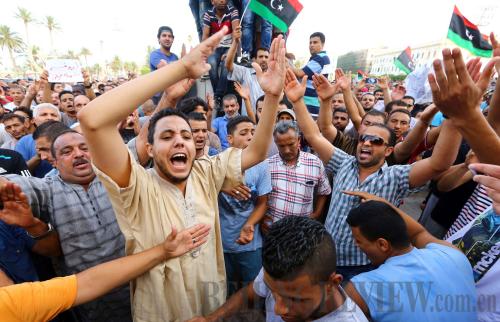|
 |
|
APPEALING FOR HELP: Libyans take part in a demonstration in Tripoli on July 31, calling for international intervention to protect civilians from militia clashes (XINHUA/AFP) |

The political unrest in affected countries following the Arab Spring movement in 2011 has shattered the illusions of the outside world concerning their smooth transition from strongman regimes to democratic ones. Libya is a particularly disconcerting case, where Western interventionism has given way to an anticlimactic series of deep domestic problems. Currently, the attempt at Western-style democracy is still at odds with the troubled political climate of Libya, which is facing a tough transition after deposing its former strongman.
Unintended consequences
After the overthrow of former Libyan leader Muammar Gaddafi, the country descended into chaos. Intensifying through early 2014, the ongoing armed conflicts between militias pushed Libya to the edge of a civil war. The new round of crises broke out nearly simultaneously in both the east and west of the country. In Tripoli in May, the Libyan parliament came to a deadlock over disagreements regarding prime minister candidates, which eventually resulted in a parliamentary reelection in late June. On July 13, armed clashes broke out at a major airport in Tripoli between armed Islamist groups and militias from the southwestern city of Zintan. The airport was seriously damaged and the ensuing fighting has yet to end. The clashes have paralyzed air traffic to and from Tripoli. In Benghazi, the nation's second largest city, retired Major General Khalifa Haftar led a series of military actions against armed Islamist groups in mid-May in the name of "purging terrorists." So far, there is still no end in sight for the fighting between the two sides.
As the security situation deteriorates in Libya, many countries have evacuated their nationals and diplomatic personnel and shut down their embassies in the country, including Britain, France and the United States—the same countries that played a decisive role in overthrowing the Gaddafi regime. Their commitment to assisting with the reconstruction of Libya has come under question, as little has been done to break the political stalemate and prevent a civil war.
For example, the United States demonstrated restraint after the U.S. Consulate in Benghazi was targeted in an attack that killed the U.S. ambassador in September 2012. With comparatively little at stake in Libya, the Obama administration has turned its focus away from the war-torn country. Most observers agree that Libya, which is beset with enormous difficulties in carrying out its political transition and reconstruction, must manage the crisis largely on its own without the help of the United States or any other third party.
Clarifying chaos
Three factors are complicating efforts to end the current chaotic situation in Libya.
First, the Libyan Government is unable to control militia forces, each of which occupies an area of its own in the country. The civil war in 2011 has resulted in the emergence of several competing groups. Claiming credit for the war's success, these militias are unwilling to give up their weapons or dissolve. On the contrary, some forces that did not even participate in the fighting have formed new militias in an attempt to have a bigger say in post-war power-sharing arrangements. The militia forces are extremely complex—with different origins and competing ideologies—and their interests vary widely. This explosive mixture is bound to create an increasing number of armed conflicts.
|
